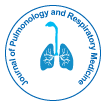Nosso grupo organiza mais de 3.000 Séries de conferências Eventos todos os anos nos EUA, Europa e outros países. Ásia com o apoio de mais 1.000 Sociedades e publica mais de 700 Acesso aberto Periódicos que contém mais de 50.000 personalidades eminentes, cientistas de renome como membros do conselho editorial.
Periódicos de acesso aberto ganhando mais leitores e citações
700 periódicos e 15 milhões de leitores Cada periódico está obtendo mais de 25.000 leitores
Indexado em
- ICMJE
Links Úteis
Diários de acesso aberto
Compartilhe esta página
Abstrato
Understanding Pulmonary Emphysema: Causes, Symptoms, and Management
Devlena Khan
Pulmonary emphysema is a chronic and progressive respiratory condition characterized by the irreversible destruction of lung tissue and the development of abnormally enlarged air sacs, known as alveoli. This abstract provides an overview of pulmonary emphysema, exploring its primary causes, common symptoms, and available management strategies. Pulmonary emphysema primarily results from long-term exposure to irritants, most notably cigarette smoke. Inhalation of these irritants triggers inflammation, which leads to the breakdown of the lung's elastic fibers and the eventual destruction of alveoli. Genetic factors, such as alpha-1 antitrypsin deficiency, can also contribute to the development of emphysema. Emphysema often manifests with a range of debilitating respiratory symptoms. Shortness of breath, especially during physical activity, is a hallmark sign. Other common symptoms include chronic cough, wheezing, and excessive mucus production. As the disease progresses, individuals may experience weight loss, fatigue, and decreased tolerance for exercise.pulmonary emphysema is a chronic lung condition with significant implications for patients' respiratory health. Understanding its causes, recognizing its symptoms, and implementing appropriate management strategies are vital for improving the lives of those affected by this debilitating disease. Early intervention, especially smoking cessation, plays a pivotal role in slowing its progression and enhancing patients' long-term outcomes.
Diários por Assunto
- Agro e Aquicultura
- Alimentação e Nutrição
- Bioquímica
- Ciência da Computação
- Ciência de materiais
- Ciencias ambientais
- Ciências Clínicas
- Ciências Farmacêuticas
- Ciências gerais
- Ciências Médicas
- Ciências Sociais e Políticas
- Ciências veterinarias
- Economia e Contabilidade
- Enfermagem e cuidados de saúde
- Engenharia
- Engenheiro químico
- Física
- Genética e Biologia Molecular
- Geologia e Ciências da Terra
- Gestão de negócios
- Imunologia e Microbiologia
- Informática
- Matemática
- Química
Revistas clínicas e médicas
- Anestesiologia
- Assistência médica
- Biologia molecular
- Cardiologia
- Cirurgia
- Dermatologia
- Diabetes e Endocrinologia
- Doenças infecciosas
- Enfermagem
- Fisioterapia e Reabilitação
- Gastroenterologia
- Genética
- Hematologia
- Imunologia
- Medicamento
- Medicina Reprodutiva
- Microbiologia
- Nefrologia
- Neurologia
- Odontologia
- Oftalmologia
- Oncologia
- Ortopedia
- Pediatria
- Pesquisa Clinica
- Pneumologia
- Psiquiatria
- Toxicologia

 English
English  Spanish
Spanish  Chinese
Chinese  Russian
Russian  German
German  French
French  Japanese
Japanese  Hindi
Hindi